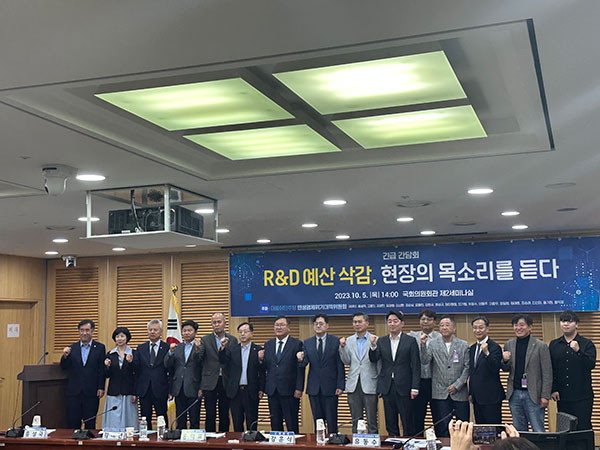지난 5일 국회에서 더불어민주당 민생경제대책위원회(김태년 위원장)는 'R&D 예산 삭감, 현장의 목소리를 듣다' 간담회를 개최했다. 정부가 ‘연구비 카르텔’을 이유로 발표한 계획에 직격타를 맞은 과학계는 전례 없는 예산 삭감을 반대하며 ‘국가과학기술바로세우기 과학기술계연대회의’를 출범했다.
5일 민주당 'R&D 예산 삭감’ 간담회 개최
연구 과제 중단·인원 감축…장기적 피해 전망
과학 연구, 학문 특성 이해 바탕으로 기반 마련
정부가 2024년 국가 연구개발(R&D) 예산을 대폭 삭감한 가운데, 예산 삭감 철회 및 과학계와의 소통을 강조하는 전문가들의 목소리가 거세다.
지난 5일 국회에서 더불어민주당 민생경제대책위원회(김태년 위원장)는 'R&D 예산 삭감, 현장의 목소리를 듣다' 간담회를 개최했다. 간담회에는 △문성모 출연연 과학기술인협의회총연합회 회장 △이승복 한국과학기술단체 총연합회 이사 △이어확 국가과학기술바로세우기 과학기술계연대회의 공동대표 △김재성 전국과학기술연구 전문 노조위원장 △안병국 카이스트 대학원 학생회 부학생회장 등이 참석했다.
지난 6월 정부는 R&D 예산을 16.6%(5조 2천억원)가 삭감된 25조 9천억원으로 책정했다. 과기부 주요사업비는 13.9%(3조 4천억원)이 감소한 21조 5천억원으로, 특히 정부출연연구기관(출연연)의 주요사업비 삭감 규모는 25%를 넘는다.
정부가 ‘연구비 카르텔’을 이유로 발표한 계획에 직격타를 맞은 과학계는 전례 없는 예산 삭감을 반대하며 ‘국가과학기술바로세우기 과학기술계연대회의’를 출범했다. 전문가들은 연구비 삭감으로 인해 당장 내년 연구 과제 중단 및 연구원 감축을 비롯한 장기적인 인재 유입 감소 현상을 우려했다.
이날 이승복 서울대 치의학대학원 교수 겸 한국과학기술단체 총연합회 이사는 합당한 예산안을 수립하기 위해 정부와 과학계의 소통을 강조했다. 이 교수는 “현재 연구자들은 정부의 청사진을 알지 못하고, 예산안이 나와서야 방향을 파악하는 상황”이며, “정부가 현장에 있는 연구자와 충분한 토론을 하고 구조를 점진적으로 바꿔 나가야 혼란이 없을 것”이라고 주장했다.
전문가들은 기초 과학 연구 사업을 국가의 장기적인 튼튼한 기반이라는 점을 강조했다.
이 교수에 따르면 대학 현장에서 예산 삭감 문제는 예산 자체뿐만 아니라 구조적으로 미래 인재 양성에 부정적인 영향을 미친다. 예산 삭감의 여파로 오래된 기초연구 사업이 중단될 경우, 연구의 다양성이 축소되고 과학의 기반 기술 경쟁력이 저하될 우려가 존재한다. 현재 기초연구연합의 성명서에 서명을 한 약 5,300명은 예산 삭감 철회와 뿌리 연구에 해당하는 학문의 사업 속성을 지켜달라 촉구했다.
이 교수는 “연구 역량은 성장 사다리를 통해 다음 세대 연구자로 옮겨가야 하지만, 연구 중단 사태가 발생할 경우 장기적인 연구 역량이 분실돼 사다리의 문턱이 높아지고 성장 기회가 반으로 줄어든다”며, “이대로면 결국 26년도에는 과제 수가 1만5천개로 줄어 3만명의 연구자의 25%만 기회가 주어진다”고 덧붙였다.
이어확 국가과학기술바로세우기 과학기술계연대회의 공동대표도 R&D 예산을 복구함과 동시에 충분한 대화를 통해 결정하자고 호소했다. 이 공동대표는 “실제로 예산의 최대 80%까지 삭감 통보받은 것을 보았다”며, “이는 과거에 수행해오던 연구가 마무리를 짓지 못하게 될 것”이라 말했다.
전국과학기술연구전문 노동조합 김재성 위원장은 장기적으로 튼튼한 기반이 되는 과학기술에 효율성을 들이대는 것 자체가 문제라고 지적했다. 김 위원장은 “과학 기술은 당장 사업 성공이 이뤄지는 분야가 아닌데 신규 혁신 기술에만 투자를 강행하고, 보이지 않는 기초 과학 분야 예산을 삭감하는 것은 오히려 장기적으로 비효율을 키우는 셈”이라고 말했다. 예컨대 2차 전지 사업에도 대부분 소부장의 투자를 수반하며 결국 기반이 되는 것은 기초 과학이다.
카이스트 안병국 대학원 부총학생회장도 “이공계 기피 현상과 특정 학과 쏠림 현상은 이미 내부에서 드러나고 있다”며, “우리는 137억년 전 생성된 우주를 연구하는 연구자들이다. 정부의 과제와 정책은 5년, 2년, 1년마다 바뀌고, 연구 성과를 요구하는 짧은 기간도 무리가 있다”고 토로했다.
출연연 한국과학기술인협의회 문성호 회장은 과학 연구 환경에서 자원, 자율성, 인내를 핵심으로 강조했다. “새로운 것을 찾는 연구 분야에 기존의 규제를 적용하기는 어렵다”며, “충분한 연구 성과를 얻기 위해 충분한 시간과 인내가 필요하다”고 말했다. 또한 이를 위한 체제로 “체벌 관점이 아니라 보상 제도를 활성화하여 좋은 인력이 과학기술 연구개발 분야로 올 수 있도록 하는 정책이 필요하다”고 주장했다.
김태년 위원장은 "이제껏 R&D 예산을 지켜 동력이 되어 경제 성장을 이룬 국가”로서 “이번 예산 심사에서 정책적으로 가장 첫 번째가 될 것”이라고 말했다.
.jpg)
